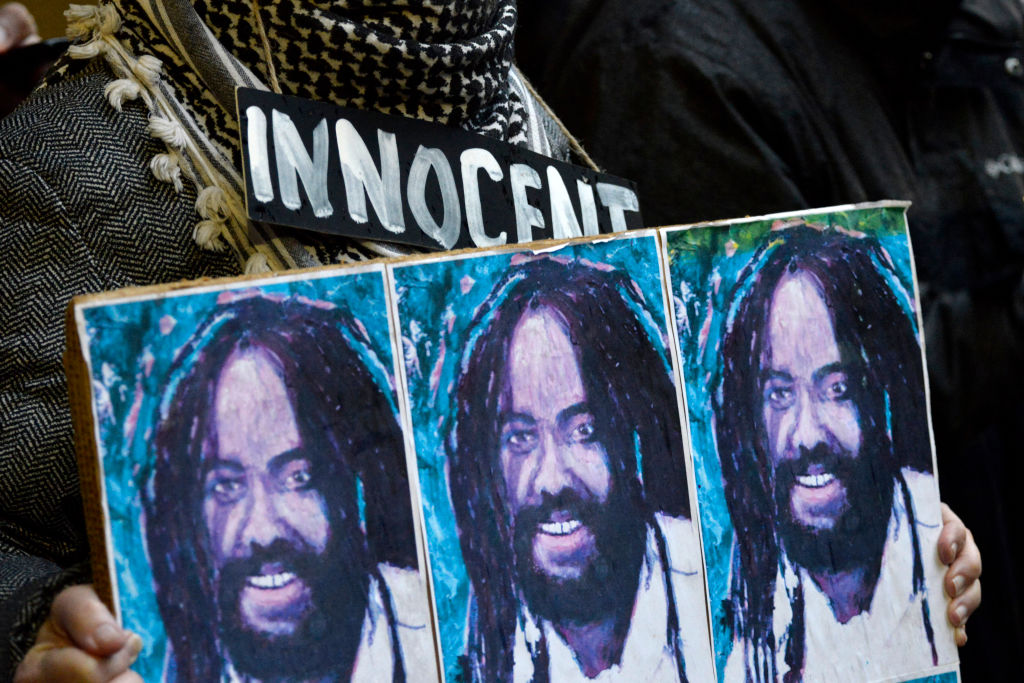5 Reasons Why Mumia Abu-Jamal Should Be Released
Source: NurPhoto / Getty
UPDATED: 3:30 p.m. ET, Oct. 26, 2022
Originally published on Dec. 8, 2011
Former Black Panther Party member Mumia Abu-Jamal has become an icon in the movement to free political prisoners in the U.S. while serving decades behind bars for a crime he has maintained he never committed.
On Wednesday, Abu-Jamal’s petition for a new trial based on “new evidence” was being heard by the court of common pleas in Philadelphia, the same city where he was convicted of killing a white Philadelphia police officer more than 40 years ago.
MORE: 10 Things You Didn’t Know About Mumia Abu-Jamal
Abu-Jamal’s legal team argues in the petition that boxes discovered in the Philadelphia district attorney’s office in 2018 contain “highly significant evidence which the commonwealth never previously disclosed” and confirm his innocence. One of the items in the boxes was a letter written by the star witness in Abu-Jamal’s murder trial and sent to the District Attorney who prosecuted the case. The Guardian reported that letter suggests there was a financial arrangement to pay the only eyewitness in the case who identified Abu-Jamal during the trial. Another way to say it is that it looks like the witness was bribed in exchange for his testimony.
“I have been calling you to find out about the money own [sic] to me,” Robert Chobert, who is largely credited for securing Abu-Jamal’s conviction, wrote to DA Joseph McGill. “Do you need me to sign anything. How long will it take to get it.”
Without Chobert’s testimony, Abu-Jamal may not have been convicted in a case that was heavy on circumstantial evidence and lacking physical evidence — one of several valid reasons why Mumia Abu-Jamal should be released.
Who is Mumia Abu-Jamal?
Born Wesley Cook, Abu-Jamal was an activist and journalist sitting in his taxi in Philadelphia just before 4 a.m. on Dec. 9, 1981, when police officer Daniel Faulkner conducted a traffic stop of a light blue Volkswagen driven by his brother, William “Billy” Cook. Abu-Jamal, who was parked just across the street, approached the scene. Within minutes, Abu-Jamal had been shot in the chest and Faulkner had been shot dead. Abu-Jamal was arrested as the accused perpetrator.
The details of precisely how those fateful minutes unfolded remain one of the most debated accounts in recent history. However, since his conviction in 1982, there has been mounting evidence of Abu-Jamal’s innocence along with no shortage of books, movies and fashion styles dedicated to the movement to “Free Mumia.”
Keep reading to find five top indications that Mumia Abu-Jamal is innocent.
Faulty Evidence
1. Aside from the discovery of new evidence, there was never a “blow-back” test conducted to show gun residue on Abu-Jamal. The original medical examiner’s report, which was not seen by the 1982 jury that convicted him, stated that the fatal bullet was a .44 caliber. However, Abu-Jamal was carrying a legally registered .38 caliber Charter Arms revolver.
Source: NurPhoto / Getty
2. Pedro P. Polakoff, a Philadelphia freelance photographer who reports he arrived at least 10 minutes before the arrival of the Mobile Crime Detection Unit, took photos that show Officer James Forbes was handling the guns retrieved from the crime scene with his bare hands, which is not the appropriate protocol and may have compromised the evidence used to convict Abu-Jamal.
Source: SCOTT NELSON / Getty
3. At the time of the trial, the police and the district attorney’s office failed to notify Abu-Jamal’s defense about a driver’s license application for Arnold Howard found in the front pocket of Officer Faulkner’s shirt, which may prove that a fourth person was involved. Later, Howard said that he loaned his temporary, non-license ID to Kenneth Freeman, a business associate of Billy Cook, whom Cook said confessed. Freeman was found dead in 1985, reportedly naked and gagged.
Source: NurPhoto / Getty
Witness Tampering
4. After the 1982 trial, Veronica Jones, a police informant who was working as a prostitute at the crime scene, revealed that police had coerced her and Cynthia White, another informant who was called as a witness to testify to Abu-Jamal’s guilt. A third woman, Yvette Williams, submitted an affidavit in 2002 declaring that while she was in jail with White, White told her about the alleged coercion.
Source: Getty Images / Getty
Official Corruption
5. In the late 90s, an investigation of the Philadelphia Police Department exposed many corrupt officers who violated civil rights and stole from suspects. Nearly 1,400 cases were reviewed and more than 100 people were released. One of the officers investigated agreed that he and his girlfriend would cooperate in further efforts. His girlfriend was Pamela Jenkins, the informant who said she was coerced into testifying to Abu-Jamal’s guilt.
SEE ALSO:
Mutulu Shakur Has Terminal Cancer. Organizers Are Making A Major Push For His Release
Former Black Panther Sundiata Acoli Wins Parole Appeal After Nearly 50 Years In Prison
The post 5 Reasons Why Mumia Abu-Jamal Should Be Released appeared first on NewsOne.

